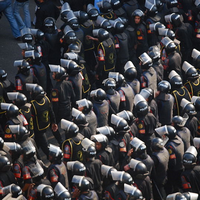The wave of popular uprisings sweeping throughout the Middle East may give new life to what Evgeny Morozov, in his just-released book, "The Net Delusion," called the "Google doctrine": the "fervent conviction that given enough gadgets, connectivity and foreign funding, dictatorships are doomed." Morozov initially dismissed that doctrine last August, when it appeared that the Iranian government had decisively broken that country's Green Movement. But his assertion that new information technologies can just as easily be used in the service of strengthening authoritarian regimes as in toppling them is now being challenged by pundits citing the role of YouTube, Facebook and Twitter in fomenting the protests rocking the Arab world.
"Cyber utopians," as Morozov calls them, will cite the events of the last two months -- and particularly what occurred in Egypt's Tahrir Square -- as proof that he is far too pessimistic about the possibility of the Web 2.0 being the catalyst for the fourth wave of global democratization. But many of his critics should consider the nagging question raised in the latter part of Morozov's narrative: why Egypt's Facebook Revolution of 2008 failed.
In April of that year, textile workers in the city of Mahala went out on strike. In support of their demands, the "April 6" movement was formed using Facebook, attracting some 70,000 Egyptian internet users as supporters. But while the group, which was the subject of a New York Times magazine profile by Samantha Shapiro in January 2009, engaged in lively online debate about the future of Egypt, its offline impact was more limited. Both Morozov and Shapiro made the point that "April 6" could only make an impact if it could tie its online network with offline events, something it failed to do.

